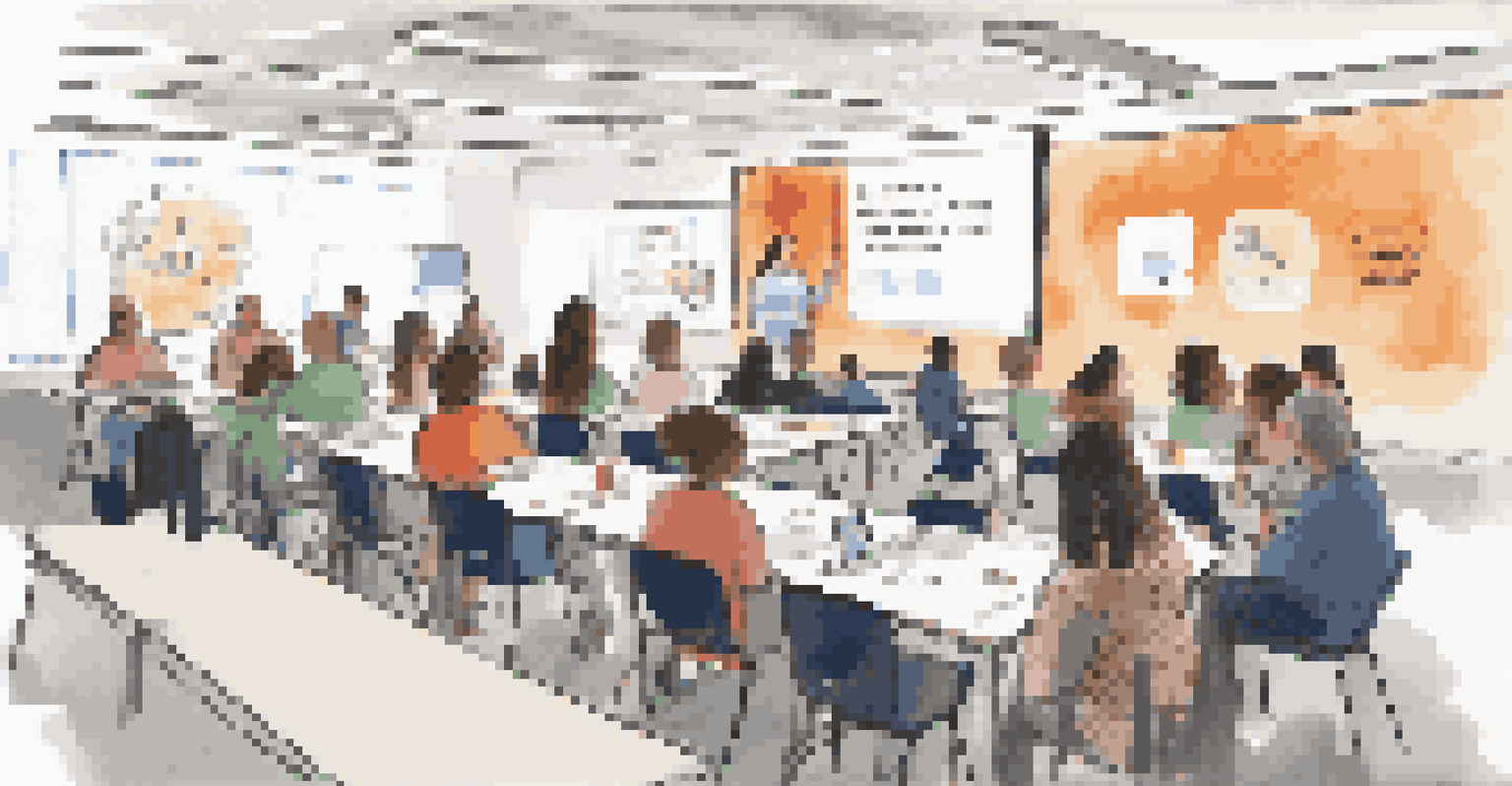Fostering Digital Citizenship in Blended Learning Models

Understanding Digital Citizenship in Education
Digital citizenship refers to the responsible use of technology and the internet. In educational contexts, it encompasses a range of skills, including online communication, digital literacy, and ethical behavior. With the rise of blended learning models that combine online and face-to-face instruction, fostering digital citizenship has never been more crucial.
The internet is becoming the town square for the global village of tomorrow.
Students today navigate a digital landscape that is rich with information and opportunities. However, this also exposes them to risks like misinformation and cyberbullying. Educators play a key role in helping learners understand the importance of being responsible digital citizens, preparing them for both academic success and personal growth.
By integrating digital citizenship into blended learning, educators can create a safe and supportive environment. This approach not only enhances students' online experiences but also empowers them to become informed, respectful, and engaged members of the digital world.
The Importance of Blended Learning Models
Blended learning models bring together the best of both worlds: traditional classroom settings and online learning. This flexibility allows educators to tailor their teaching methods to meet diverse learning styles and needs. In this environment, digital citizenship becomes a vital component that students must master.

Through blended learning, students can engage with digital tools and platforms that enhance their educational experience. This exposure not only improves their technical skills but also encourages them to think critically about their online interactions. Understanding the implications of their digital actions helps foster a sense of responsibility.
Digital Citizenship is Essential
Fostering digital citizenship prepares students to navigate online challenges and promotes responsible technology use.
As students learn in a blended environment, they are better equipped to navigate the complexities of digital communication and collaboration. This prepares them for future academic challenges and equips them with the skills needed in a technology-driven workforce.
Key Components of Digital Citizenship
Digital citizenship encompasses several key components, including digital literacy, online etiquette, and cybersecurity. Each of these areas plays an essential role in guiding students' interactions in the digital world. Educators must address these components to foster a comprehensive understanding of digital citizenship.
Digital literacy is not just about technology; it's about understanding the implications of technology in our lives.
Digital literacy is the foundation of effective online engagement. It involves the ability to find, evaluate, and use information responsibly. By teaching students how to discern credible sources from unreliable ones, educators empower them to make informed decisions.
Online etiquette, or 'netiquette,' refers to the unwritten rules of respectful online communication. Students should learn how to communicate effectively and responsibly, understanding the impact their words can have. Coupled with knowledge of cybersecurity, which includes protecting personal information, these components help students navigate the digital landscape safely.
Strategies to Promote Digital Citizenship
Promoting digital citizenship in blended learning environments requires intentional strategies. Educators can incorporate discussions about online behavior into their lesson plans, encouraging students to share their thoughts and experiences. This creates a collaborative atmosphere where learners can learn from one another.
Additionally, integrating real-world scenarios into lessons can help students understand the relevance of digital citizenship. Case studies, role-playing, and simulations can provide valuable insights into how online actions can lead to both positive and negative outcomes. These activities foster critical thinking and reflection.
Blended Learning Enhances Skills
Blended learning models support diverse learning needs while integrating digital citizenship into students' education.
Lastly, educators should model responsible digital behavior themselves. By demonstrating ethical online practices and treating others with respect, teachers set a powerful example for their students to follow. This builds a culture of digital citizenship within the learning community.
Engaging Parents in Digital Citizenship
Parents play a crucial role in fostering digital citizenship at home. To ensure that students practice responsible online behavior beyond the classroom, educators should actively engage parents in discussions about digital citizenship. This collaboration can create a consistent approach to guiding students.
Workshops and informational sessions can help parents understand the challenges and opportunities their children face in the digital world. By equipping parents with knowledge and resources, they can better support their children in developing responsible online habits. This partnership enhances the learning experience for everyone involved.
Additionally, sharing resources such as articles, videos, and tools about digital citizenship can keep parents informed. When parents and educators work together, they can create a united front that reinforces the importance of respectful and responsible online behavior.
Assessing Digital Citizenship Skills
Assessing students' digital citizenship skills is essential for understanding their progress and areas for improvement. Educators can use various assessment methods, including quizzes, projects, and self-reflections, to gauge students' understanding of digital citizenship concepts. This helps ensure that students are meeting the necessary standards.
Rubrics can be particularly useful in providing clear criteria for evaluating students' digital interactions. By outlining expectations for online communication, collaboration, and ethical behavior, educators can guide students toward successful outcomes. This clarity empowers learners to take ownership of their digital citizenship journey.
Parental Involvement is Key
Engaging parents in discussions about digital citizenship creates a consistent approach to guiding students' online behavior.
Moreover, regular feedback is crucial in helping students develop their skills further. By providing constructive feedback, educators can encourage students to reflect on their online behaviors and make necessary adjustments. This ongoing dialogue fosters a growth mindset, promoting continuous improvement in digital citizenship.
The Future of Digital Citizenship in Learning
As technology continues to evolve, the importance of digital citizenship in education will only grow. Emerging technologies, such as artificial intelligence and virtual reality, will present new challenges and opportunities for students. Preparing them to navigate these advancements responsibly is vital for their future success.
Blended learning models will likely become even more integrated with technology, making it essential for educators to stay current with digital citizenship trends. By continually updating curricula to reflect new developments, educators can ensure that students remain equipped to handle the complexities of the digital age.

Ultimately, fostering digital citizenship is not just about teaching students how to use technology safely; it's about preparing them to be thoughtful, responsible citizens in a connected world. As we embrace the future of education, let's commit to nurturing these essential skills in our learners.